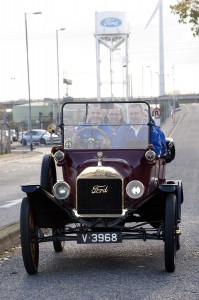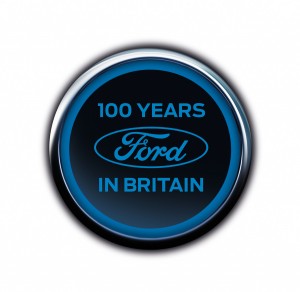Ford celebrates 100 years in Great Britain
TODAY is Ford of Britain’s 100th birthday and this year also sees Ford marking 100 years of vehicle manufacturing in the UK.
As it recognises these centenary landmarks in the UK, Ford is confirming its commitment to a country which has made it the market leader in car sales for 34 consecutive years and the commercial vehicle sales leader for 45.
Ford’s UK automotive industry leadership is broader than pure sales. In the UK, Ford directly employs over 15,000 people, many in highly skilled roles developing and building high-technology, fuel-efficient, low CO2 engines. The Ford plants at Bridgend in South Wales and Dagenham in East London have the combined capacity to assemble two million engines annually and one in three Ford cars globally is powered by a UK engine. A further 100,000 jobs are supported through the Ford supplier chain and dealer network.
Ford is investing £1.5-billion in low carbon engineering and manufacturing that will help underpin the UK’s manufacturing and export-based economic recovery.
Ford of Britain chairman, Joe Greenwell, said: “Ford of Britain has been in the fabric of the nation for over a hundred years. We have a proud heritage and a bright future. Ford of Britain is a major pillar of Ford’s global strategy and the new Ford Focus, centrepiece of the centenary, features advanced powertrains developed and produced in the UK.”
Over 80 years after its opening, Dagenham is still London’s largest industrial employer and around 40,000 Ford vehicles – the iconic Ford Transit – are built in the UK each year at the Ford Southampton plant.
Ford Dagenham also provides a leading example of the company’s sustainability strategy. The most economical internal combustion engines Ford produces are assembled in a plant that generates all its own electricity, from wind power. The Dagenham wind turbines produce 6.7-million kilowatt hours of clean electricity each year – which has avoided over 6,500 tonnes of annual CO2 emissions, since 2004.
There are parallels between Henry Ford’s success with the Model T, in the early 20th Century and the success of the company today, with the Ford Focus, created for the 21st Century. It is the basis for 2.5 million units of global annual production and at the heart of the new Ford Focus are engines and transmissions designed, engineered and manufactured in the UK at Dunton in Essex, Dagenham to the East of London, Bridgend in Wales and Halewood near Liverpool.
Heritage
Henry Ford founded the Ford Motor Company in 1903 and within months, had exported the first Ford cars to England. He established the first British Ford dealer, through a company based in Long Acre, in London. The UK quickly became the most important market for Ford cars, outside the United States.
By 1911, Henry had decided to start building cars in Britain. Ford Motor Company (England) Limited was incorporated in London on 8 March 1911 – the first Ford company to be established outside North America.
Later in 1911, Trafford Park, a suburb of Manchester, played host to Ford’s first UK factory with a disused tram works converted to Model T assembly opening in October. Four-man teams built individual vehicles until Henry Ford’s revolutionary introduction of the moving assembly line in 1913. By 1914 Ford sales of nearly 10,000 cars were equal to the output of the next six biggest British manufacturers combined.
A few years later, in 1928, Henry Ford oversaw the construction of the “Detroit of Europe” – a new British plant on the banks of the Thames, at Dagenham. Its first vehicle rolled off production lines in October 1931 – a Ford AA truck.
Motorsport and family values
The Dunton Technical Centre was born in 1966. That same year, Ford scored its famous 1-2-3 victory at Le Mans, with the iconic, Ferrari-beating GT40 race car – built by Ford of Britain in Slough and Ford engines powered the top five finishers in the Indianapolis 500.
One year later, the Ford Cosworth DFV engine scored the first of a record 155 Grand Prix victories, over 18 dominant years.
Ford’s unmatched motorsport heritage has benefitted greatly from British talent. Ford’s first ‘works’ rally efforts were based at Boreham in Essex and the UK has been intrinsically linked with top level Ford rally success.
Ford’s World Rally Team is today run by Cumbria-based M-Sport and they are one the largest employers in their local area, with 216 full-time staff. M-Sport works directly with Ford engineers in the UK and Europe sharing skills and experience from competition that feed back into engineering processes and inform further development of vehicles, engines and components.
The results of their efforts have been seen in the all-new Ford Fiesta RS World Rally Car – powered by a Bridgend-built, 1.6-litre Ford EcoBoost engine – that scored a 1-2-3 victory last month in its debut WRC rally in Sweden and followed that up with second and third places in Rally Mexico.
Ford of Britain has been associated with cars whose names have earned affection and admiration in the streets and on the racetracks. Zephyr, Anglia, Cortina, Capri, Escort, Sierra, Fiesta, and Focus are often fondly remembered family members while the Ford Transit has been adopted as a generic name for a carry-all van. Mondeo man has even entered popular culture but in all cases Ford vehicles have been known for providing successive generations with great motoring and great value.
Celebrations
The history of Ford of Britain’s first 100 years is captured in entertaining, and comprehensive, fashion in Eric Dymock’s “The Ford in Britain Centenary File”. Dove Publishing’s (www.dovepublishing.co.uk) book provides a fascinating insight into 100 years of company history and detailed descriptions of the vehicles that have touched the nation more than any other car company.
Ford plans a year-long centenary celebration with themed marketing campaigns to flag up this special year. A Ford of Britain centenary logo has been created, which delivers its message as text on a keyless Ford Power starter button.
Historical displays will take place at various motoring events and a gala event will take place in the first half of 2011.
Ford-related events are being held around the country including the National Motor Museum at Beaulieu, Hampshire and the Heritage Motor Centre at Gaydon, Warwickshire. This year’s Goodwood Revival, the country’s premier historic motoring event, will see a significant number of classic Ford cars take to the circuit, in September.


